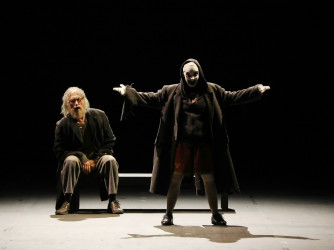 France Festival d’Aix-en-Provence [4] – Boesmans, Pinocchio: Soloists, Klangforum Wien / Emilio Pomarico (conductor). Grand Théâtre de Provence, Aix, 14.7.2017. (MB)
France Festival d’Aix-en-Provence [4] – Boesmans, Pinocchio: Soloists, Klangforum Wien / Emilio Pomarico (conductor). Grand Théâtre de Provence, Aix, 14.7.2017. (MB)

Cast:
Director of the Troupe, First Crook, Second Murderer, Circus Director – Stéphane Degout
Father, Third Murderer, Schoolmaster – Vincent Le Texier
Puppet – Chloé Briot
Second Crook, Cabaret Director, Judge, First Murderer, Donkey Salesman – Yann Beuron
Cabaret Singer, Bad Pupil – Julie Boulianne
Fairy – Marie-Eve Munger
Troupe Musicians – Fabrizio Cassol (saxophone, improvisation coordination), Philippe Thuriot (accordion), Tcha Limberger (violin tzigane)
Production:
Joël Pommerat (director)
Éric Soyer (set designs, lighting)
Isabelle Deffin (costumes)
Renaud Rubiano (video)
As the third of my four Aix operas this year, I saw the Festival’s new commission: Pinocchio, with music by Philippe Boesmans, to a libretto by Joël Pommerat, after his own play (itself, of course, in some sense ‘after’ Carlo Collodi). I wish I could be more enthusiastic about what I heard, but I was very much left with a feeling of something that had fallen between (at least) two stools. Is this a ‘children’s opera’, whatever that might be? There were certainly some children in the audience, although not that many: perhaps hardly surprisingly, for a performance that started at 8 pm. and finished at 10.40. (There were, though, two performances out of the six that started earlier, at 5 pm, on Sundays.) I could not help but think that if it were ‘for’ children, it might usefully have been about half the length. Indeed, pacing seems a bit odd more generally: lingering somewhat earlier on, perhaps with room for a cut or two.
Is it, then, a work about childhood, or some other form of work ‘for’ adults, using a children’s story as its basis? Again, I am not sure. For Boesman’s musical language and the use to which he put it seem determined to accommodate: somewhat at odds, I think, with what struck me as a rather more interesting libretto and indeed staging by Pommerat. Perhaps we should leave arguments concerning whether children need assistance into the world of opera by tonality until another day; for me, that is actually part of the problem, making post-tonal music – more than a hundred years on! – something to grow into, even to fear. So-called popular culture, more usually mass culture (quite a different, exploitative thing) has a great deal to answer for – in every respect, as any good, or even bad, Adornian would tell you. I was a little surprised, in any case, not only by the frankly tonal language employed throughout, but also by the almost childish – or should that be childlike? – simplicity of the score. A few motifs of reminiscence will certainly help anyone gain his or her bearings; a few references to other operas might appeal to people who like that sort of thing; a few more ‘with it’ moments may or may not grant a degree of ‘street’ relevance. (I suspect you can guess what I think.) However, whereas Pommerat’s libretto and the (literal) darkness of his production seem very keen lightly to explore the darker side of the fable, to open up philosophical questions concerning existence, a lack of justice in the world and so on, the score almost sounds as if it were intended for a children’s television programme. Nothing wrong with that, you might say, and perhaps not, but there seems neither to be genuine, productive conflict between different impulses and possibilities, nor the true collaboration of which the Festival’s outgoing director, Bernard Foccroulle, speaks in the programme: more a bit of a mismatch.
In performative terms, it all looked and sounded tremendous. No one could accuse the Festival of having done anything other than wholeheartedly supported the project. The Puppet, as he is always called, looked anything but cuddly, instead almost horror-movie fodder. Chloé Briot’s spirted performance stood much more in a line of offering fruitful dramatic conflict. Stéphane Degout proved a towering presence onstage, not least in the largely spoken narrative role of the Director of the Troupe. It seemed a bit of a waste of his talents, though, to have him devote so much of his time to speaking, and when singing, to lavish such vocal beauty and verbal acuity on so musically facile a part. Vincent Le Texier’s seemingly wise, certainly compassionate Father impressed too. Marie-Eve Munger stood out in the high-lying part of the Fairy, whose lack of straightforwardness (on Pommerat’s part) certainly intrigued. Klangforum Wien under Emilio Pomarico offered truly luxurious orchestral support; I cannot imagine they have often, if ever, played anything quite like this. Again, though, it did seem to me somewhat to squander the talents of one of the finest new music ensembles in the world. Last month, Répons in Vienna; this month, well, this.
It is certainly not that I am against ambiguity concerning audience, or broader appeal; far from it. This, however, gives the impression – or at least did so to me – that, perhaps like Pinocchio himself, it does not know quite what it wants to be. Or perhaps the problem lies with me, and I do not know what I want things to be. At any rate, whilst I was happy enough to have seen the opera, I cannot imagine wanting to do so again; for me, at least, the Festival’s offerings of The Rake’s Progress and Carmen proved infinitely more dramatically satisfying. Now, one Cavalli opera, Erismena, to go…
Mark Berry
